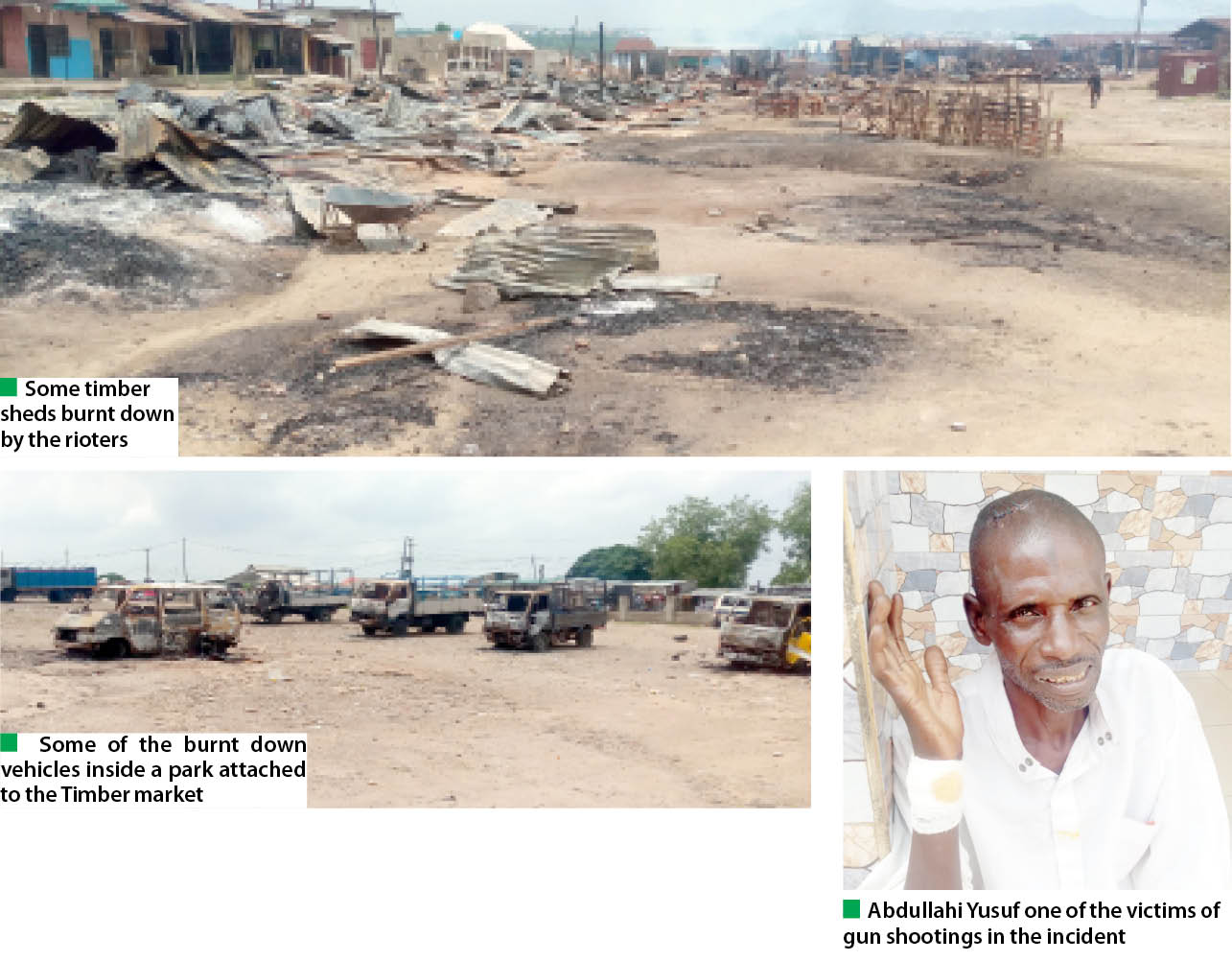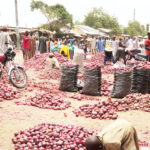Five days after the violent clash in Abuja between traders and commercial motorcyclists, better known as okada riders, at a popular market located in Dei Dei, Abuja Municipal Area Council (AMAC)/Bwari of the Federal Capital Territory (FCT), victims of the incident have begun to count their losses. Daily Trust on Sunday reports.
The popular Dei Dei market hosts at least four businesses, including building materials, timber, tomatoes and scrapped materials.
- Viable mining sector can address revenue shortfall – Prof Garba
- How states can survive as oil revenue declines
A visit to the already shut down market by Daily Trust on Sunday showed that no fewer than five shops, housing different building materials like tiles, ceilings, planks, paints, among others, were razed down by the angry mob.
Trouble started when an accident involving a bike man led to the breakdown of law and order in the community when traders were said to have attacked an okada rider, whom they blamed for recklessness, which led to the death of his passenger.
The okada rider’s colleagues reportedly moved to rescue him from the attackers and the situation degenerated afterwards.
Another account has it that the driver of the trailer which crushed the passenger to death was attacked and some persons mobilised to defend him.
Narrating how the incident happened to Daily Trust on Sunday, a witness, Abubakar Surajo, said the traders were angered by the development, demanding that the rider be handed over to them.
“They succeeded in seizing the motorcyclist from his colleagues and no one could exactly say what happened to him thereafter,” Surajo added.
Dahiru Garba, the secretary of the traders’ secretary, whose shop is located near the tomato market where about five of their members lost their lives, said gunshots were flying within their neighbouring timber shed market.
Garba said that earlier some youths from the timber market had seized a sizable number of motorcycles from their owners who plied the route, and in the process, set them ablaze after seizing the motorcycle the late young woman had fallen off from after they had set it ablaze.
“Concerned by the development, the okada people mobilised themselves and headed into the timber market, passing through an area where the market shares boundary with open space and farms.
“Our members had to hurriedly close business due to the trauma brought by the trouble, while members of our market security guards blocked the entrance leading into the market in order to stop other people from penetrating, or our members to get mixed with the rioters,” Garba added.
He said it was about some minutes after 1pm when the security men arrived the location and were struggling to disperse the rioting motorcyclists off the road around the timber shed market that gunshots were fired within the said market toward a mosque there.
“The shootings came from the timber market, and clearly, based on the bullets used, they were local guns. Two of our members were killed within the mosque premises, while two others were shot dead under a tree, located just outside the mosque.
“The fifth person lost his life in a private hospital known as Crown at Gwagwa, where he was rushed to, along with other injured persons,” Garba added.
The market official further noted that they later understood that the shootings were made by security guards of the market, adding that about 30 other people sustained various degrees of injury.
Abdullahi Yusuf was one of the persons said to have been injured by the gunshots.
Narrating to Daily Trust on Sunday about how he survived the incident, he said, “I work as an off-loader of tomatoes in the market. I was standing with a friend, Jamilu, in front of a pharmacy just behind the central mosque here. I was in the process of telling him that we should leave the scene, only to see him falling down. I was also injured.
“On getting to the hospital, however, no bullet was traced, either in my injured head or hand, so the affected spots were stitched, along with other treatments before I was discharged by the doctors a day after,” Yusuf added
The incident, which happened on Wednesday, also extended to Shagari Quarters and the new Saburi junction, where a church was razed and two lives were lost respectively.
At the timber shade particularly, Daily Trust on Sunday observed that property valued at millions of naira, comprising timber and wood processing machines, vehicles and motorcycles, were among the valuables lost to the tragedy.
It was learnt that the remains of the deceased were kept at the mosque for hours before they were deposited at the University of Abuja Teaching Hospital in Gwagwalada, where the bodies were reportedly examined.
The bodies were later buried on Thursday after an official security permission was granted.
Minister orders closure of markets
During his visit to the site, the minister of the FCT, Malam Muhammad Musa Bello, directed that all markets in the axis, comprising timber shade, building materials, scrap items, as well as tomatoes, be closed
He also ordered a full scale investigation into the incident.
Accompanied by Commissioner of Police Sunday Babaji, director of the Department of State Services (DSS), chairman of the AMAC, Abdullahi Adamu Candido, among others, the minister expressed concerns over the loss of lives and valuables in the incident.
Bello, who was received by the traditional leader of the community, as well as the leader of the traders, urged them to cooperate in fishing out the bad eggs in their fold and also assist in bringing them to justice.
Describing the incident as simply that of criminals who took laws into their hands, he said it was neither religious nor ethnic.
Unreported mayhem in Saburi community
At the end of the incident, which claimed eight lives after police and other security operatives’ intervention, residents, traders, motorcyclists, tricycles and others who escaped death, are gnashing their teeth over their losses.
Our correspondents who visited the place on Saturday, report that the losses majorly affected members of the tomato market near the popular ‘timber shade’ and building materials side.
At the new Saburi community, a settlement where many traders around the Abuja building materials market, including those of timber shade reside, shared part of the May 18 mayhem, leading to the loss of two people, burning of five motorcycles, as well as about 20 petty traders’ kiosks.
Ibrahim Umar, one of the affected persons operating business around the junction that leads to the community, said youths from the nearby market stormed the area around 1pm of the incident day, descending on them and burning their goods in the process.
He alleged that two people were killed under his watch, comprising a motorcyclist.
He said a popular vulcaniser in the area, known as Baba Gwadabe, was hit severally, along with one of his neighbours, who owns a provision store around the area.
Sulaiman Abdullahi, who lost his provision items parked inside a 10-meter container, gave the number of the burnt kiosks there to a little over 20. “I took refuge from afar while watching the development when I overheard one of the rioters saying, “Look at Malam there.”
“I had to scale over a fence in order to escape, as the gate that led into the settlement was under key and lock at the time,” Abdullahi added.
He recalled that this is the second time he witnessed such losses around the area. He said a similar incident took place during the 2019 election campaigns rally, adding that about 10 vehicles on the convoy of the present FCT minister were set ablaze en route there for a campaign.
Our correspondents report that the facility was still under lock and key as at Saturday based on the FCT minister’s directives.
A leader of the in-house security men during Saturday’s visit asked one of our correspondents to return in one hour time to meet the market leader for any interview. But the security man later said the market leader could not be available at the time due to some issues. He, however, allowed the reporters to be conducted round the affected sites of the market following a request.
He insisted that the estimate of the loss could not be ascertained within two days after the incident, saying more time is needed to contact the victims individually before arriving at the total loss.
It was discovered during the visit that the affected sites were made up of timber sheds, with some of them attached with heavy machineries for wood processing, contrary to some reports that described them as shops.
Twelve vehicles, comprising mini trucks, pickups, as well as passenger vehicles, were also burnt during the attack by rioting okada riders.
At the time of our visit, smoke was still billowing at a spot parked with wooding ceiling sheets, just like numerous other places where there were heaps of timber dust.

 Join Daily Trust WhatsApp Community For Quick Access To News and Happenings Around You.
Join Daily Trust WhatsApp Community For Quick Access To News and Happenings Around You.


